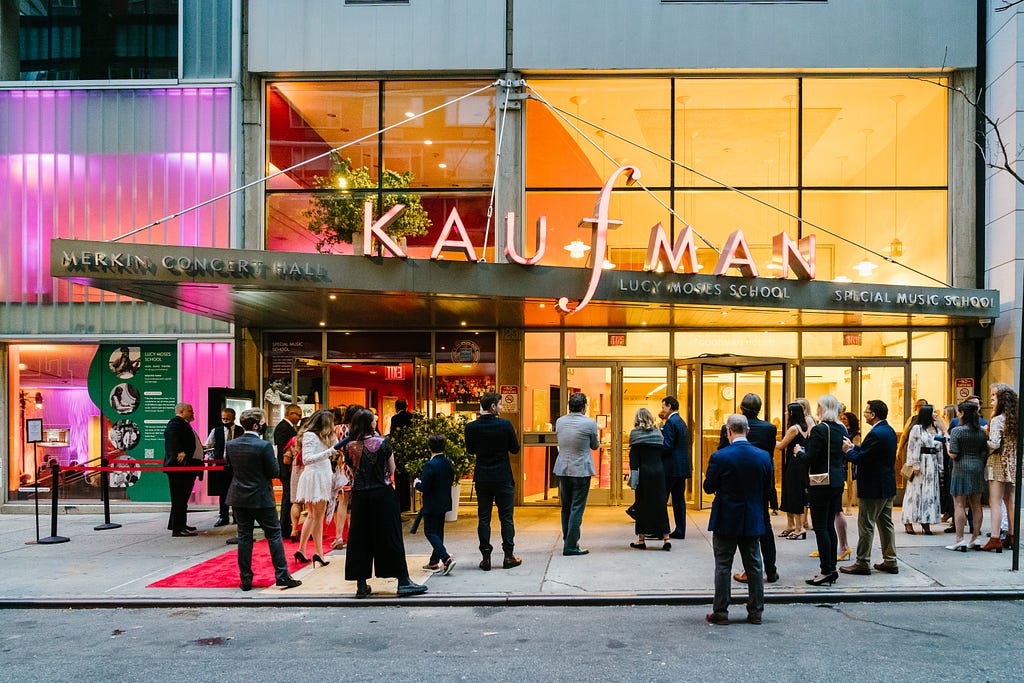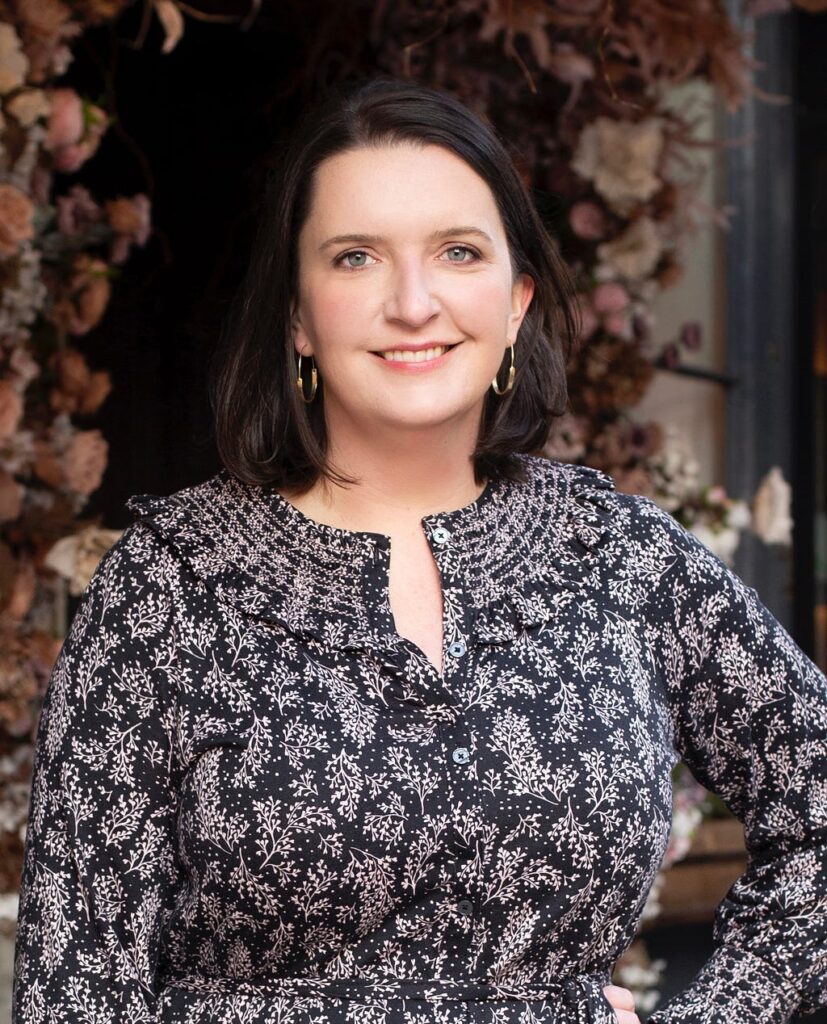Kate Sheeran of Kaufman Music Center: 5 Things You Need To Know To Successfully Lead A Nonprofit Organization
Your heart has to be in the mission. Running a non-profit is hard work and takes a lot of commitment, time, and, yes, fundraising! I don’t know how I would do it if I didn’t realize that our work positively impacts people’s lives.
As part of my series about “individuals and organizations making an important social impact”, I had the pleasure of interviewing Kate Sheeran.
Kate Sheeran became Executive Director of Kaufman Music Center in August of 2018. Since then, she has launched several Center-wide initiatives, including Artists-in-Residence, robust community programming, and increased collaborations between the Center’s schools and professional presenting sides. Notably, she has led Kaufman Music Center through the COVID-19 crisis, resulting in programmatic and organizational success and international acclaim for its innovative approach during this time. Through the launch of Musical Storefronts, over 130 safe concerts were produced for the community and to employ professional artists when concert halls were closed. The initiative was featured in 60 print and television news stories spanning 17 countries including The New York Times, Forbes, BBC, Al Jazeera, CBS, ABC, and NBC. At the same time, Middle School students from Kaufman Music Center’s Special Music School wrote and illustrated the book Who is Florence Price? which became published internationally by G. Schirmer and reached #1 in classical music biographies on Amazon. The story has been featured in national press including NPR, GMA3, and The Kelly Clarkson Show, and the project has resulted in an ongoing partnership with The Philadelphia Orchestra.
Previously, Kate served as Provost and Dean of the San Francisco Conservatory of Music. In that capacity, she served as the chief academic officer of the institution, oversaw all curricular and programmatic areas, led the faculty, and launched a professional development curriculum for all students. Earlier in her career, Kate was a member of the leadership team at Mannes School of Music, where she was an assistant dean and directed all pre-college and continuing education.
As a professional horn player, Kate has performed with a wide range of ensembles including Ensemble Signal, The Wordless Music Orchestra, Alarm Will Sound, Ensemble LPR, and the
San Francisco Ballet Orchestra. She has recorded for the Nonesuch, Cantaloupe, Western Vinyl, New Amsterdam, XL, Tzadik and Warp labels, and for commercial television and film. Kate has been a faculty member at Dickinson College, Susquehanna University, Bucknell University and Mannes Prep.
Kate received her undergraduate degree, Certificate in Arts Leadership, and Performer’s Certificate from the Eastman School of Music, and an MM from the Yale School of Music. She has served on the Boards of Kinhaven Music School and Alarm Will Sound and is currently on the Boards of the Lincoln Square Business Improvement District and JACK Quartet.
Thank you so much for doing this with us. Before we begin our readers would like to get to know you a bit more. Can you tell us a bit about your “backstory”?
I was lucky to have great music teachers in public school and, later, in private French horn lessons and youth orchestra programs while growing up in a small town in Vermont. I loved singing from a young age and really took to playing music in groups with friends. That led me to college at the Eastman School of Music and later at Yale, then to a professional performing and teaching career. Along the way, I learned that helping to shape programs and organizations was a great way to link my passion for music and the human connections forged through the arts, and the leadership portion of my career grew from there. I have been fortunate to have roles like my previous one as Provost and Dean of the San Francisco Conservatory of Music, and now as Executive Director of Kaufman Music Center, the NYC-based performing arts institution that houses two schools and a professional concert hall. At Kaufman, I get to be at the forefront of shaping music education and presenting today’s best artists while ensuring access for everyone is a top priority.
Can you tell us the story behind why you decided to start or join your non nonprofit?
I joined Kaufman Music Center because how we shape our programs impacts the future of music. Part of how I approach my work is ensuring I’m always putting myself in the shoes of those we are trying to serve — — students, performers, staff members, teachers, board members, audience members, etc. I love our musical ecosystem at Kaufman and how we can reflect our values on stages and in classrooms, the kinds of mentors our students get to have, and the
unique and innovative opportunities we can give to anyone interested in learning music, theater, or dance, or experiencing it as an audience member. Leading Kaufman Music Center touches on all the experiences that led me here, and I love the synergies in every corner of the building and anywhere we make great things happen. Our vibe is mission-centric — everyone from staff to board to faculty to students is invested in what happens here, and people often comment that it feels like a home to them.
Can you describe how you or your organization aims to make a significant social impact?
As part of our ongoing efforts to provide musical education access without barriers, we launched Our Pathways program, a ground-breaking tuition-free program supporting children ages 8–13 in getting access to free music education. Pathways offers students weekly private instrumental lessons and access to masterclasses, workshops, and performances. Additionally, Kaufman Music Center provides the students (at no cost) an instrument and with a MetroCard for their travel to lessons. We are partnering with public schools, community centers, cultural organizations, and music teachers all over NYC — including community partners like Bronx Housing Community Center, Goddard Riverside Community Center, and SCAN-Harbor Performing Arts Academy at SCAN-Harbor Inc — to recruit highly motivated students in late elementary and early middle school grades. This program is helping give students all over New York access to free music education, which has been making a significant social impact because it provides access at no cost. And Kaufman Music Center has long been home to Special Music School, our public school run in partnership with New York City Public Schools. We provide free, intensive music for students in grades K-12 (including private lessons and ensembles!) for all students to attend — a true rarity in public schools.
Without saying any names, can you share a story about an individual who was helped by your idea so far?
We recently learned that a student in our Pathways program would potentially move out of New York City. When faced with that possibility, they asked their parents to stay so they could keep their music education at Kaufman Music Center! Luckily, their family decided to stay put. Hearing that reminds us how important this program has already become to young New Yorkers. That’s why we do what we do.
Are there three things the community/society/politicians can do to help you address the root of the problem you are trying to solve?
We know that music education improves students’ lives. It fuels their dreams and creativity and has remarkable academic outcomes. Every single one of our seniors at Special Music School has graduated and gone on to college or conservatory. We need more robust requirements and financial support for music education — here in NYC and across the country.
How do you define “Leadership”? Can you explain what you mean or give an example?
Leadership is being able to see the vision for the future, being able to navigate bumps in the road that may come up, and building and empowering a team around you to help the organization move forward. Kaufman Music Center was agile and creative during the COVID crisis, which led us to community projects like Musical Storefronts, which made a difference for professional musicians and music lovers in NYC when we needed it most. That wouldn’t have happened without leadership from staff at every level and a host of community members who came together to realize that vision. I will be forever grateful.

Based on your experience, what are the “5 things a person should know before they decide to start a non-profit.” Please share a story for example for each.
- Your heart has to be in the mission. Running a non-profit is hard work and takes a lot of commitment, time, and, yes, fundraising! I don’t know how I would do it if I didn’t realize that our work positively impacts people’s lives.
- Surround yourself with a strong team. The best ideas can come from anyone. I love learning from our team members and trying to foster a culture where creativity is encouraged.
- Not every initiative needs to be a non-profit — sometimes the best way forward is a partnership or collaboration. Investigate every possibility! Recent college graduates often ask me how to start a non-profit. I then ask them more about their idea/challenge/goal and discuss all of the possible ways it could happen.
- Find people who have different strengths and experience and learn from them! Part of my education in non-profit leadership happened by joining boards of organizations and learning from people with different professional backgrounds — finance, corporate leadership, real estate, architecture — everything I have picked up along the way has come in handy! I’m also lucky to have varied expertise and experiences among our Board of Trustees here at Kaufman Music Center — they are so valuable to our work in formal and informal ways every day.
- Find joy in your work — even for a moment — every day. Here at Kaufman, you may find me popping into a rehearsal or class or chatting with faculty or students in the hallway. These moments remind me why I take on the necessary challenges to do the work so close to my heart and help me tell others about the amazing things that happen here!
We are very blessed that very prominent leaders read this column. Is there a person in the world who you would like to talk to, to share the idea behind your non profit?
I am inspired by the impactful generosity of Mackenzie Scott and her Foundation. I would love to introduce her to our outstanding young musicians!
Can you share your favorite “Life Lesson” Quote? How is that relevant to you in your life?
I like the quote from Conan O’Brien: “If you work hard and you’re kind, amazing things will happen.” And I love the line from John Irving’s “A Prayer for Owen Meany”: “If you’re lucky enough to find a way of life that you love, you have to find the courage to live it.” But daily, I love the messages on the walls around our building from things our young students have written. So many gems! I have at least one in my office at all times.
How can our readers follow you online?
Readers can learn more about the Kaufman Music Center on
https://www.kaufmanmusiccenter.org/
This was very meaningful, thank you so much. We wish you only continued success in your mission.
Kate Sheeran of Kaufman Music Center: 5 Things You Need To Know To Successfully Lead A Nonprofit… was originally published in Authority Magazine on Medium, where people are continuing the conversation by highlighting and responding to this story.
